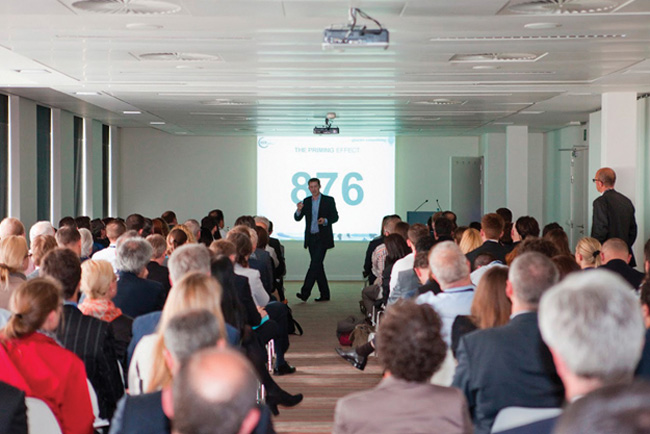Redacción Alabrent
Thomas Hübner, Executive Director Europe of Carrefour, and Jan Zijderveld, President Europe at Unilever, opened by criticising their own industry sector: more needed to be done in terms of innovation, the commitment to sustainability needed to be more convincing, and young talent needed to be recruited for the supply chain to master these tasks successfully over the coming years."Customers are changing dramatically, largely due to technology and new lifestyles", stated Zijderveld. "As the largest employer in Europe, our industry carries great responsibility. Our customers expect they can trust us when they buy something." And Hübner adds: "The industry has improved by 6 % in terms of CO2 emissions, the retail trade by 7 %, but that is not enough. The target must be annual improvement of 4 % up to 2020."
The ECR Congress definitely took the sponsorship of talent seriously. Three Awards were conveyed on the first evening and targeted at improving cooperation in the value chain: one for a Best Practice example in supply chain cooperation, one for a life's work and one Next Generation Leader Award. The Best Practice example will hopefully find followers: the Award went to Tesco and Coca-Cola, who exchanged managers for a year to gain experience from the other partner!
Changes in purchasing experience
Ken Hughes of Glacier Consulting came right to the point: shopper marketing is ultimately a behavioural science. At its core is an understanding of why shoppers behave as they do, which is then harnessed to trigger purchases. But traditional approaches such as shopper focus groups and interviews only yield so much. The newer fields of neuro-marketing, consumer psychology, biometrics and big data are where the real breakthroughs are taking place. Understanding shopper motivation and consumer psychology can increase business without touching price or margin. Hughes presented a ground-breaking study that maps shopper arousal "triggers" in FMCG using state-of-the-art mobile biometric sensors.
A group of experts from different areas – Benoit Golay, (Icare Institute), Sylvain Rebet (Bobst), Derren Sequeira (Facebook), Ken Venn (Indaba), Geoffroy de Myttenaere and Jean-Albert Nyssens (McKinsey) – explained potentials and market-ready concepts in the context of mobile phones and read Big Data. Mobile phones, smart or not, offer enormous opportunities for companies to change the game with shoppers. There are more mobile phones in the world than there are tooth brushes. Add to this the data from social networks where consumers exchange information. It is estimated that 4 exabytes (1 exabyte = 1 billion gigabytes) of unique information will be generated this year alone. These are Big Data: their scale, distribution, diversity, and timeliness need to be analysed using new technical architectures to gain insights and create new values. A huge challenge for industry to approach consumers more individually and in a more targeted manner. But a challenge certainly worthwhile taking up as 1:1 marketing becomes significantly less expensive than to date.
Barry Carty (BWG Foods), Declan Carolan (ECR Ireland), Iñigo Anton (Findus), Rob Mullen (Kerry Foods) und Shay Leonard (Unilever) covered the cooperation between branded suppliers and the retail trade in practice. The question being how to create sustainable growth in mature categories where consumer spending is constrained and without having to pull the price and promotion levers. The response: real collaboration, focused on the consumer and shopper journey, can inspire and produce groundbreaking results, even in categories with refrigeration requirements. Together, solutions were found for the POS which led to significant increases in sales. The shopping experience is the key: informing consumers about the benefits of products (“You don´t buy what you don´t understand”) and to provide an easy and enjoyable shopping experience.
One of the highlights in the programme was the presentation by Serpil Timuray, CEO of Vodafone Turkey. She gave an impressive demonstration of how smartphones and other mobile devices bring consumers closer to markets and products. In the USA, some 6 of purchases are already done online, and in the coming year half of all purchases will either be generated online or at least influenced by online channels. Gartner predicts, that in 2016 some 450 million people will already be making mobile payments - with a transaction value equal to 600 billion dollars.
The topic of Big Data was also of major importance to Timuray: as more and more consumers are connected via the Net this results in enormous data volumes. Big Data is expected to grow by 40 % a year. Big Data will make consumers even more powerful than ever before: they can compare products and prices real-time at the point of purchase. For industry and the retail trade this provides the option of providing tailor-made offers based on information on demographics, personal purchasing behaviour, preferences and the current location of the consumer. Amazon, one of the pioneers of such strategies, reports that some 30% of sales are already generated via recommendation marketing.
"We have obtained similar results for Kraft in Turkey. We put unique codes on ten million packs of crisps and invited the largely younger consumers to take part in a promotion. 35% responded, a fantastic response. And sales were up by 27%!
Another important topic is regional marketing. "Customers willing to receive advertising and living in the vicinity of a "Caffè Nero“ coffee shop were offered a free morning coffee together with another purchase." The redemption rate was 10%, a significant success rate for the chain.
The road to sustainability
"How to guide shoppers to more sustainable choices?" was the question Valérie Sérjourne (AISE), Anne Vandenbergen (Colruyt), Neil Coles (CSCP) and Franz Speer and Malte Turk (Henkel) posed. The answer: using an holistic approach and working together along the entire value chain. Concrete examples from manufacturers and retailers provided insights and answers on how to guide shoppers towards more sustainable choices. Future growth is likely to depend on less resource intensity and providing more value added services. Efficiency alone will not be enough to bring current consumption patterns to sustainable levels, widespread changes will also be required to behaviours and lifestyles. Consumers today often believe that they are already buying sustainable products, even if this not the case. To alter their behaviour they need to perceive a benefit for themselves. This is where industry and retailers must cooperate as a change in attitude harbours great potential.
The Consumer Goods Forum – represented by Onno Fransse (Ahold), Sabine Ritter (CGF), Megan Hellstedt (Delhaize), Britta Gallus (Metro Group), Saliha Barlatey (Nestlé) and Nigel Bagley (Unilever) – has identified a number of areas where, by working together, the industry was able to make significant progress. Three key areas of commitment were designated under the motto "Building better lives through better business”:
1. Deforestation: help achieve zero-net deforestation by 2020
2. Refrigeration: start phasing out HFC refrigerants (fluorinated hydrocarbons) by 2015
3. Health and well-being will have a greater focus in future - supported by a broad set of initiatives - from healthier products to responsible marketing and educating consumers.
In terms of food safety, the Global Food Safety Initiative has been operational for a number of years to provide continuous improvement of food safety management systems.
Summary
At the end of the congress Jan Zijderveld painted a clear picture as to how older and younger consumers differ: "The older shopper has more time, shops more often and is very price sensitive. The younger shopper buys less often, is more quality conscious, more sustainability conscious and is IT-affine. We therefore only have half the touch points to reach the younger shopper who is more interested in quality and more ready to pay premium prices when compared to the older shopper. E-commerce is growing rapidly, and younger people do not divide their world into digital and physical, for them it is a single world. They walk through the store with their smartphone and collect information. In the UK, Internet sales have already reached the 5% level and France is also growing fast. This will change our industry completely over the next ten years and we must be a part of this change."
And Thomas Hübner adds: "To do this, it’s all about cooperation and sharing insights. In the best possible manner and with full responsibility for sustainability. Our customers demand this. It is amazing, the way we live today. We are healthier today, have better foods, a better lifestyle, we have never before lived so well. But we also face phenomenal challenges, economically, in terms of the environment and, specifically in Europe, the governments.
What does all this signal for the development of the carton?
Packaging will play a far greater role in future than today, it is the medium which unites the brand, product information and the Internet. Furthermore, carton can present brands and products very attractively on the Internet. The surface design options provide cartons with an optimal base as they can best present the brands and information and because digital codes can be read perfectly - also individual codes in the new world of Big Data.
In terms of sustainability, cartons have already staked their claim: conservation of resources and recycling are sustainable contributions to the supply chain and support consumers in developing a more sustainable lifestyle. The sustainability of European cartons is given additional support by using cartonboard from raw materials coming from sustainably managed forests.
Cartons are the only packaging medium which already provides a positive answer to questions of the future. They are fully integrated in the trend – and part of the "Bright Future“.
www.ecreuropeforum.net



